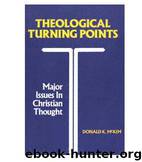Theological turning points. Major issues in christian thoughts by Donald McKim

Author:Donald McKim [McKim, Donald]
Language: spa
Format: epub
Published: 2012-01-03T21:15:42+00:00
Authority in the Middle Ages
Growth of the Papacy
The bishop of Rome assumed considerable stature as a source of authority in the early church, and this position developed into the Roman Catholic papacy. The bishop of Rome’s claim of primacy among other bishops is based on an interpretation of New Testament texts concerning Peter and the “Petrine function.” The main text is Matthew 16:18, where Jesus says to Peter, “And I tell you, you are Peter [Gr. Petros], and on this rock [petra] I will build my church, and the powers of death [lit. gates of Hades] shall not prevail against it.” Other important texts are John 21:17 and Luke 22:31, 32.
The primacy of the bishop of Rome as pope underwent a long and tangled historical development. Not all theologians agreed with the interpretation of Matthew 16:18 given by Pope Gregory I (d. 604):
To all who know the Gospel it is obvious that by the voice of the Lord the care of the entire church was committed to the holy apostle and prince of all the apostles, Peter… . Behold, he received the keys of the kingdom of heaven, the power to bind and loose was given to him, and the care and principality of the entire church was committed to him… . Am I defending my own cause in this matter? Am I vindicating some special injury of my own? Is it not rather the cause of Almighty God, the cause of the universal church? … Certainly, in honor of Peter, the prince of the apostles, [the title “universal”] was offered to the Roman pontiff by the venerable Council of Chalcedon. 25
An early interpretation by Origen was that Peter referred to every Christian. While Cyprian said that Peter was the symbol of the unity of the church, he had a more collegial conception of the episcopate when he wrote, “The other apostles were all that Peter was, endowed with equal dignity and power, but the start comes from him alone.”26 Other ways of interpreting the passage played off the name Peter against the word petra (rock). The rock on which the church is built may be the person of Peter, as the proponents of the primacy of Peter argued. It may be Peter, the other Apostles, and their successors. The church may be built upon the faith that Peter confessed, or the rock may be Christ himself as apprehended by faith. Each of these interpretations, as well as others, came to the fore at some point.27
A strong theoretical justification for the preeminence of the bishop of Rome based on the biblical texts emerged only after the middle of the third century. Pope Damascus (36684) began the custom of using the term apostolic see to describe the Roman church, in order to elevate Rome among the other apostolic churches and to protest Constantinople’s new status as capital of the empire (by the decree of the Emperor Constantine), since that city had no claim to apostolic foundation. Damascus also argued that the
Download
This site does not store any files on its server. We only index and link to content provided by other sites. Please contact the content providers to delete copyright contents if any and email us, we'll remove relevant links or contents immediately.
The Lost Art of Listening by Michael P. Nichols(7487)
Why I Am Not A Calvinist by Dr. Peter S. Ruckman(4146)
The Rosicrucians by Christopher McIntosh(3509)
Wicca: a guide for the solitary practitioner by Scott Cunningham(3166)
Signature in the Cell: DNA and the Evidence for Intelligent Design by Stephen C. Meyer(3125)
Real Sex by Lauren F. Winner(3009)
The Holy Spirit by Billy Graham(2942)
To Light a Sacred Flame by Silver RavenWolf(2813)
The End of Faith by Sam Harris(2732)
The Gnostic Gospels by Pagels Elaine(2527)
Waking Up by Sam Harris(2453)
Nine Parts of Desire by Geraldine Brooks(2355)
Jesus by Paul Johnson(2351)
Devil, The by Almond Philip C(2324)
The God delusion by Richard Dawkins(2300)
Heavens on Earth by Michael Shermer(2277)
Kundalini by Gopi Krishna(2179)
Chosen by God by R. C. Sproul(2159)
The Nature of Consciousness by Rupert Spira(2094)
